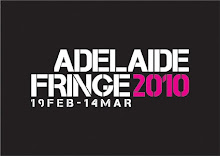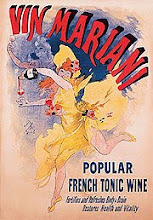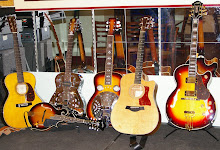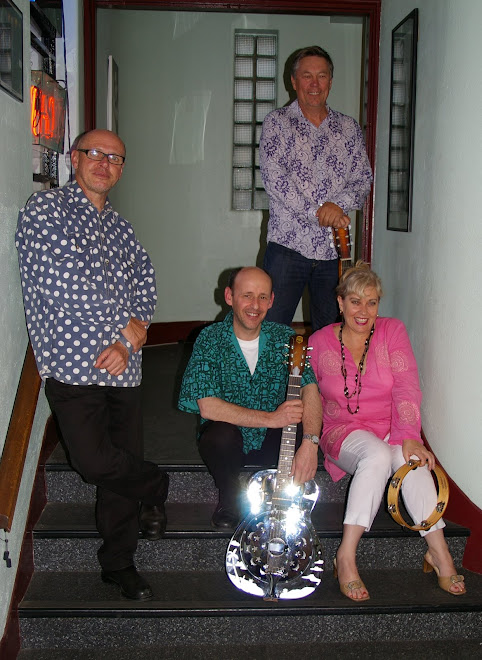2 months ago
Saturday, April 2, 2011
The halcyon days of hippies
Out of the Square Productions present Songs of Peace and Protest as the Angry Penguins re-live the causes-that-mattered through song and story. From Woody Guthrie's workers rights (Do-Re-Mi), to the early days of the environmental movement (Big Yellow Taxi), the Penguins explore the songs which made a difference.
The protest retrospective follows their popular Fringe show - a Restaurant Like Alice. Whether you sipped bad coffee at the Catacombs on Hackney Road or frequented the Purple Onion in Unley, these songs will take you back to the sweet strains of cafe-style folk to political satire in song.
Matinee performances will take place in cultural and arts centres throughout Adelaide and the Barossa Valley from April 5 to 15.
Bookings:
Saturday, June 5, 2010
Friday, February 19, 2010
A smoke, a pill and the six o' clock swill - opening night
Opening night at the Promethean in Grote Street was a packed house, lots of laughs and a generous, warm audience - thank you!
The show started with a forlorn woman sitting at the bar (or piano, in this instance) ordering 'Something Cool' before delivering the male side of things with blokey and raucus renditions of Slim Dusty's 'Duncan' and 'Cigarettes and Whiskey'.
In true Penguin style, A smoke, a pill and the six o' clock swill was a chronology of drug use and abuse starting with the Majestic Hotel in 1950s Adelaide and moving back through time to the cocaine imbibing aristocracy of Victorian England to contemporary themes of homelessness and wrecked lives.The Penguins explored the drug-addled adventures of Arlo Guthrie (who secreted a reefer by eating it mid flight to avoid getting caught by customs) and paid homage to Easy Rider. They also exposed the caring, sharing nature of cigarette and pharmaceutical companies.
Opening night of A smoke, a pill and the six o clock swill was a journey woven through the ins and the outs; the ups and the downs and the masculine and feminine side of drug taking.
There are still some tickets left to some of the shows, so tell all your friends.
Here is our song list to whet your appetite:
• Something Cool (Billy Barnes, Sung by June Christie)
• Mother’s little helper (The Rolling Stones)
• I Drink (Mary Gauthier)
• Cocaine (JJ Cale)
• Needle and the Damage Done (Neil Young)
• Simple Man (Steve Earle)
• Meeting Across the River (Bruce Springsteen)
• Alabama Song (sung by Jim Morrison and Marianne Faithful, written by Kurt Weill)
• Cigarettes and Whiskey (Vernon ‘Tim’ Spencer)
• Drunken Angel (Lucinda Williams)
• Sunday Morning Coming Down (Kris Kristofferson)
• Shaking Hands ( arr. Michelle Shocked)
• Don’t Bogart that Joint (Elliot Ingber/Larry Wagner, Sung by Fraternity of Man)
• White Rabbit (Jefferson Airplane)
• Nips are getting bigger (Mental as anything)
• Love is the Drug (Bryan Ferry)
Virginia Slim
(on behalf of the Angry Penguins - Kent, Gasper, Buddah Sticks and Coolibah)
Tuesday, January 26, 2010
Friday, January 8, 2010
Fringe tickets on sale
Do you remember the six o’clock swill? How about when your doctor prescribed a packet of fags for your nerves? What were the drugs of choice for Queen Victoria, Sigmund Freud and Sherlock Holmes?
Take a trip with the Penguins from prohibition to the psychedelic era and nurture your neurosis with the soothing health benefits of a cup of coffee, a reefer, a Bex, a cigarette, a martini and a good lie down.
Nothing is sacred as the Penguins examine the marketing ploys and exploits of pharmaceutical and cigarette companies and ponder the real content of Schapelle Corby’s boogie board.
The Penguins perform in their own style the notable psychedelic classics of Jefferson Airplane and the Rolling Stones as well as some of the beautiful and haunting songs of loss and redemption of the likes of Neil Young, Kris Kristofferson, Mary Gautier and Lucinda Williams.
Virginia Slim, Penguin spokesperson, vocalist and pianist, said ‘we are really pleased to be able to remind audiences of gems such as the Kent Micronite asbestos filter, which was marketed as an innovation in smoker health.’
Ms Slim is joined by Mark Gasper (vocals, guitar), Chris Coolabah (Guitar and slide), John Kent (vocals, bass), and Buddha Sticks (Drums and Trombone)
A smoke, a pill and the six o’clock swill reminds audiences of the days when the Coolabah Cask and the drunks track home were the Friday night rituals of Australian suburban life.
Take a trip with the Penguins from prohibition to the psychedelic era and nurture your neurosis with the soothing health benefits of a cup of coffee, a reefer, a Bex, a cigarette, a martini and a good lie down.
Nothing is sacred as the Penguins examine the marketing ploys and exploits of pharmaceutical and cigarette companies and ponder the real content of Schapelle Corby’s boogie board.
The Penguins perform in their own style the notable psychedelic classics of Jefferson Airplane and the Rolling Stones as well as some of the beautiful and haunting songs of loss and redemption of the likes of Neil Young, Kris Kristofferson, Mary Gautier and Lucinda Williams.
Virginia Slim, Penguin spokesperson, vocalist and pianist, said ‘we are really pleased to be able to remind audiences of gems such as the Kent Micronite asbestos filter, which was marketed as an innovation in smoker health.’
Ms Slim is joined by Mark Gasper (vocals, guitar), Chris Coolabah (Guitar and slide), John Kent (vocals, bass), and Buddha Sticks (Drums and Trombone)
A smoke, a pill and the six o’clock swill reminds audiences of the days when the Coolabah Cask and the drunks track home were the Friday night rituals of Australian suburban life.
Friday, December 11, 2009
Cocaine - a Victorian mother's little helper
As Queen Victoria had nine kiddies, it's no wonder she resorted to cocaine wine and gum to get through her day. Her whacky contemporary, Sigmund Freud, prescribed coke as a treatment for postnatal depression If she lived in Australia in the 50s and 60s, she would have rolled up a pound note and had a line of Bex and a good lie down.
The Victorian era - despite its reputation for prudishness and repression - saw the burgeoning of not only alcohol use, but prescription drugs which are now vilified and criminalised. Heroin and laudanum (an opium derivative) were widely prescribed and became staples of the Victorian medicine kit. Heroin (marketed and distributed by Bayer) was prescribed to women for period pain and depression as a 'non-addictive' alternative to morphine. Cocaine was used as a treatment for morphine addiction.
Industrialisation (which helped distribution) and greater family income, meant these drugs were much more easily obtainable.
Cocaine found its way into cold tonics, toothpaste, cigarettes (thank you tobacco companies) and nasal sprays.
Cocaine was also to be found in alcoholic drinks - notably Mariani Wine. This wine was enjoyed by Her Maj (and the Pope). However, when when she entertained a young Winston Churchill (as internet legend would have it) they chose to chew cocaine gum to soothe their ailments.
Another famous person who used cocaine was Sigmund Freud. He described the drug as providing 'lasting euphoria', an increase in 'self-control and vitality' and the ability to work for long periods of time without fatigue.
In literature, the bohemian Sherlock Holmes injected the substance with a syringe kept in a leather case.
Before too long, it became associated with prostitutes, pimps and ne'r-do-wells and it lost its respectability eventually becoming outlawed in the United States in 1914. All good things eventually come to an end - or perhaps it was recognised for the poison it really was.
Despite the good press given by the likes of Siggie Freud, coke (and its various offspring) is a nasty substance leading to a range of health, financial and social problems. Some of the health problems cited include headaches, violence, heart attack, convulsions, psychosis, nosebleeds and so forth.
Sources used:
Child and youth health
South Australian Drug and alcohol services, 2006
Harding, Oliver and Jockic, 2000
http://en.wikipedia.org/wiki/Cocaine
http://www.a1b2c3.com/drugs/coc02.htm
http://www.chm.bris.ac.uk/webprojects2001/straughan/3.htm
The Victorian era - despite its reputation for prudishness and repression - saw the burgeoning of not only alcohol use, but prescription drugs which are now vilified and criminalised. Heroin and laudanum (an opium derivative) were widely prescribed and became staples of the Victorian medicine kit. Heroin (marketed and distributed by Bayer) was prescribed to women for period pain and depression as a 'non-addictive' alternative to morphine. Cocaine was used as a treatment for morphine addiction.
Industrialisation (which helped distribution) and greater family income, meant these drugs were much more easily obtainable.
Cocaine found its way into cold tonics, toothpaste, cigarettes (thank you tobacco companies) and nasal sprays.
Cocaine was also to be found in alcoholic drinks - notably Mariani Wine. This wine was enjoyed by Her Maj (and the Pope). However, when when she entertained a young Winston Churchill (as internet legend would have it) they chose to chew cocaine gum to soothe their ailments.
Another famous person who used cocaine was Sigmund Freud. He described the drug as providing 'lasting euphoria', an increase in 'self-control and vitality' and the ability to work for long periods of time without fatigue.
In literature, the bohemian Sherlock Holmes injected the substance with a syringe kept in a leather case.
Before too long, it became associated with prostitutes, pimps and ne'r-do-wells and it lost its respectability eventually becoming outlawed in the United States in 1914. All good things eventually come to an end - or perhaps it was recognised for the poison it really was.
Despite the good press given by the likes of Siggie Freud, coke (and its various offspring) is a nasty substance leading to a range of health, financial and social problems. Some of the health problems cited include headaches, violence, heart attack, convulsions, psychosis, nosebleeds and so forth.
--- --- --- --- --- ---
Sources used:
Child and youth health
South Australian Drug and alcohol services, 2006
Harding, Oliver and Jockic, 2000
http://en.wikipedia.org/wiki/Cocaine
http://www.a1b2c3.com/drugs/coc02.htm
http://www.chm.bris.ac.uk/webprojects2001/straughan/3.htm
Wednesday, December 2, 2009
The Penguins at Cafe Komodo
Just a reminder that the Penguins will play at the gorgeous Cafe Komodo at 118 Prospect Road on Sunday December 13 at 2.00pm. We will preview songs from our upcoming 2010 Fringe Show:
Also, many thanks to Jill Bromley - one of the original owners of the Catacombs - for responding to an earlier blog post. Please add to the discussion about the Cafe Scene in 1960s Adelaide.
Monday, November 23, 2009
Blaze Foley - the original drunken angel
In selecting our songs, the Angry Penguins were very taken with Lucinda Williams' beautiful song Drunken Angel (from Car Wheels on a Gravel Road, 1998).
The song is about Blaze Foley - a hitherto obscure Texan songwriter and activist who was reportedly born in a treehouse and spent a great deal of his life homeless. Blaze (whose real name was Michael David Fuller) was known for his fascination with duct tape and his generous philanthropy. Although he was reputedly homeless for a good deal of time, he donated the proceeds of his one and only accessible album to a homeless shelter.
In 1989, at the age of 39, Blaze was shot protecting a feeble, elderly man. Unfortunately, after his death, the album proceeds went towards covering funeral costs. All along the way, Blaze seemed to be plagued by bankrupt record companies and rip offs.
His work has been covered by Willie Nelson, Merle Haggard and John Prine. His two most noted songs are 'If only I could fly' and 'Clay pigeons'.
It must be said, sources around the life and times of Blaze Foley are scant and there seems to have been made numerous starts on documentaries about his life. Casey Monahan provides one particularly useful account of the life and times of Blaze.
Blaze Foley was really two people. There was the caring, loving altruist, then there was the ornery, drinking poet. The former killed him, the latter was always killing him (Monahan, 1998)
However, Lucinda Williams words are perhaps the most evocative:
You're some kind of saviour singing the blues
A derelict in your duct tape shoes
Your orphan clothes and your long dark hair
Looking like you didn't care, drunken angel
Blood spilled out from the hole in your heart
Over the strings of your guitar
The worn out places in the wood
The ones that made you feel so good, drunken angel
(The drawing of Blaze is by C.P. Vaughn, 1988)
The song is about Blaze Foley - a hitherto obscure Texan songwriter and activist who was reportedly born in a treehouse and spent a great deal of his life homeless. Blaze (whose real name was Michael David Fuller) was known for his fascination with duct tape and his generous philanthropy. Although he was reputedly homeless for a good deal of time, he donated the proceeds of his one and only accessible album to a homeless shelter.
In 1989, at the age of 39, Blaze was shot protecting a feeble, elderly man. Unfortunately, after his death, the album proceeds went towards covering funeral costs. All along the way, Blaze seemed to be plagued by bankrupt record companies and rip offs.
His work has been covered by Willie Nelson, Merle Haggard and John Prine. His two most noted songs are 'If only I could fly' and 'Clay pigeons'.
It must be said, sources around the life and times of Blaze Foley are scant and there seems to have been made numerous starts on documentaries about his life. Casey Monahan provides one particularly useful account of the life and times of Blaze.
Blaze Foley was really two people. There was the caring, loving altruist, then there was the ornery, drinking poet. The former killed him, the latter was always killing him (Monahan, 1998)
However, Lucinda Williams words are perhaps the most evocative:
You're some kind of saviour singing the blues
A derelict in your duct tape shoes
Your orphan clothes and your long dark hair
Looking like you didn't care, drunken angel
Blood spilled out from the hole in your heart
Over the strings of your guitar
The worn out places in the wood
The ones that made you feel so good, drunken angel
(The drawing of Blaze is by C.P. Vaughn, 1988)
Thursday, November 19, 2009
Monday, November 9, 2009
Fags: A sexy, soothing antidote to nervous tension, irritability and depression...
A researcher by the name of Penny Tinkler, in her book Smoke signals: Women, smoking and visual culture provides the following observations:
- The feminisation of cigarettes began in the 1920s and by the 1930s they were available in Woolworths stores in Britain.
- Cigarette companies introduced coupons which the housewife could exchange for pullovers, a thermos, cameras and the like
- Woodbine had painting books for children and the famous Woodbine Model Farm
- Wills bought advertising space on behalf of the Boy Scouts' Association ('Courtesy Capstan Cigarettes)
- Older women were able to smoke cigarettes because of their sexual 'availability' but eventually it was OK for young women to be sexy too.
Tinkler explains how cigarettes were used to quell a sad marriage or keep women company when they moved out of home for the first time. She says (and I quote)
The cigarette provides a soothing antidote to nervous tension, irritability, depression, boredom and worry...the same effect as the asprin.
Subscribe to:
Posts (Atom)



















